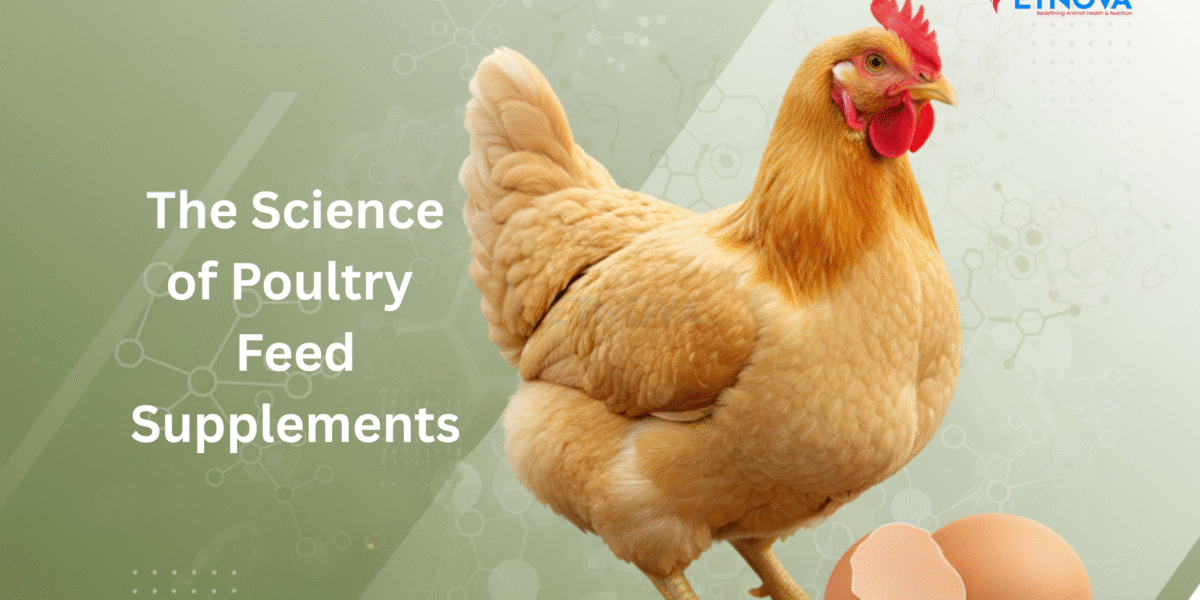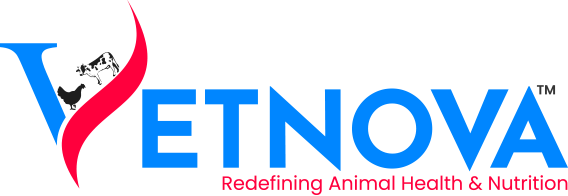Poultry Feed Supplement: Enhancing Chicken Health and Productivity
In modern poultry farming, a poultry feed supplement is more than just an additive. It is the key to maximizing growth, egg production, and overall flock health. From improving nutrient absorption to supporting immunity and reproductive performance, the right supplementation strategy can make a tangible difference in productivity and profitability. Farmers and veterinarians increasingly rely on scientifically formulated poultry feed supplements to meet the complex nutritional needs of chickens at every stage of life. This blog explores the science behind poultry supplements, their key components, and their role in poultry nutrition, gut health, and overall flock performance.
- What is a Poultry Feed Supplement?
- Importance of Calcium for Chickens
- Role of Poultry Feed Enzymes
- Components of a Poultry Feed Supplement
- Benefits of Using Poultry Feed Supplements
- Selecting the Right Poultry Feed Supplement
- Practical Tips for Using Poultry Feed Supplements
- Future Trends in Poultry Nutrition

What is a Poultry Feed Supplement?
A poultry feed supplement is a concentrated source of essential nutrients designed to complement standard poultry feed. While regular feed provides the bulk of energy and protein, it may not provide all the vitamins, minerals, and bioactive compounds chickens need for optimal growth, egg production, and immunity.
Modern poultry feed supplements are formulated based on scientific principles of poultry nutrition. They help correct nutrient deficiencies, improve feed efficiency, support gut health in poultry, and ensure chickens reach their genetic potential in growth and production.
Importance of Calcium for Chickens
Calcium plays a pivotal role in poultry nutrition, particularly for laying hens. A deficiency can led to brittle eggshells, reduced egg production, and poor bone development. Supplementing feed with calcium for chickens ensures:
- Stronger eggshells and higher hatchability
- Optimal bone strength in growing pullets and broilers
- Improved metabolic functions related to calcium-dependent enzymes
Integrating calcium-rich poultry feed supplements into the diet is essential to maintain both productivity and flock health
Role of Poultry Feed Enzymes
Poultry feed enzymes are specialized additives that enhance the digestibility of feed components such as starch, protein, and non-starch polysaccharides. Enzymes improve nutrient absorption and contribute to:
- Increased feed efficiency and weight gain
- Reduced anti-nutritional effects from complex carbohydrates
- Better gut health in poultry through enhanced microbial balance
Incorporating enzyme-enriched poultry feed supplements helps farmers achieve more efficient growth rates and reduces feed costs by optimizing nutrient utilization.
Components of a Poultry Feed Supplement
Proteins and Amino Acids
Proteins are fundamental for muscle development, tissue repair, and overall growth. Key amino acids such as lysine, methionine, and threonine are often included in poultry feed supplements. Balancing these amino acids:
- Optimizes feed conversion ratio (FCR)
- Enhances muscle development in broilers
- Supports reproductive performance in laying hens
Vitamins and Minerals
Vitamins (A, D3, E, B-complex) and minerals (calcium, phosphorus, zinc, selenium) are essential for metabolic processes, bone development, and immunity. Proper supplementation ensures that chickens maintain optimal health and productivity throughout their life cycle.
Gut Health in Poultry
Maintaining gut health in poultry is critical for nutrient absorption and disease prevention. Modern poultry feed supplements often include probiotics, prebiotics, and other gut-friendly additives that:
- Promote beneficial microbial balance in the gut
- Improve digestion and nutrient uptake
- Reduce the risk of gastrointestinal infections
Energy Sources and Feed Additives
Energy sources like grains and fats, along with feed additives such as antioxidants and flavor enhancers, complement poultry feed supplements. These ingredients improve palatability, stimulate appetite, and support overall performance.
Benefits of Using Poultry Feed Supplements
Enhanced Growth and Productivity
By providing essential nutrients in concentrated forms, poultry feed supplements help chickens reach their growth potential faster. Broilers achieve higher weight gains, while layers maintain consistent egg production and quality.
Improved Feed Efficiency
High-quality supplements improve nutrient absorption, resulting in better feed conversion ratios. This reduces overall feed costs and increases farm profitability.
Stronger Immunity and Health
Supplements fortified with vitamins, minerals, and gut-friendly additives strengthen the immune system, making birds less susceptible to disease. A healthier flock requires fewer veterinary interventions, reducing operational costs.
Sustainable and Eco-Friendly Production
Optimized nutrition reduces nutrient wastage and environmental impact. For example, proper amino acid and calcium supplementation reduces nitrogen and phosphorus excretion, supporting sustainable poultry farming practices.
Better Egg and Meat Quality
Nutrition directly influences the quality of poultry products. Poultry feed supplements ensure stronger eggshells, higher hatchability, leaner meat, and better flavor, meeting consumer expectations for high-quality poultry products.
Selecting the Right Poultry Feed Supplement
- Age and Growth Stage: Chickens at different stages, starter, grower, or layer have specific nutritional needs.
- Health Status: Birds with compromised immunity or prior health issues may require fortified supplements.
- Feed Composition: Supplements should complement the base diet and correct any nutrient deficiencies.
- Quality and Safety: High-quality ingredients and adherence to regulatory standards ensure efficacy and safety.
Consulting a poultry nutritionist or veterinarian ensures that the supplement plan maximizes growth, egg production, and overall flock health.
Practical Tips for Using Poultry Feed Supplements
Supplements should complement the base diet and correct any nutrient deficiencies.
Maintain balanced feeding to avoid nutrient excess or imbalance.
Monitor bird performance regularly to evaluate supplement effectiveness.
Store supplements in clean, dry, and cool conditions to maintain quality.
Future Trends in Poultry Nutrition
The poultry industry is moving toward precision nutrition, where diets are customized based on bird age, breed, and production goals. Innovations in feed formulation, natural poultry feed enzymes, and gut health promoters are helping farmers optimize productivity while maintaining sustainable practices. Consumer demand for antibiotic-free and nutrient-rich poultry products is driving research into advanced feed supplements that support both health and performance.
Want to know more? poultry-gut-health Click here
Conclusion
A scientifically formulated poultry feed supplement is essential for maximizing chicken growth, egg production, and overall health. By including critical nutrients such as calcium for chickens, poultry feed enzymes, and gut-supporting additives, farmers can ensure robust flock performance and improved product quality. Effective supplementation, combined with proper management practices, not only enhances productivity but also supports sustainable, scientifically driven poultry farming. Modern poultry nutrition demands more than basic feed. It requires smart, evidence-based supplementation to achieve profitable and healthy flocks.
Yes, supplements that support immunity and gut health can reduce disease incidence, lowering reliance on antibiotics.
Supplements should be used routinely depends on bird age, production stage, and nutrient requirements; consulting a nutritionist ensures proper scheduling.
Supplements should be used routinely depends on bird age, production stage, and nutrient requirements; consulting a nutritionist ensures proper scheduling.
Proper nutrition, including supplements, supports immune function, which can enhance the effectiveness of vaccines.
Balanced feed supplements improve digestion and nutrient absorption, resulting in drier, more uniform droppings.
Yes, optimized supplementation improves feed efficiency and bird health, often leading to higher returns even on smaller farms.
